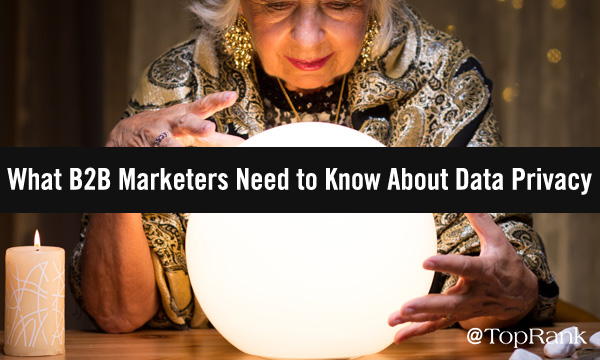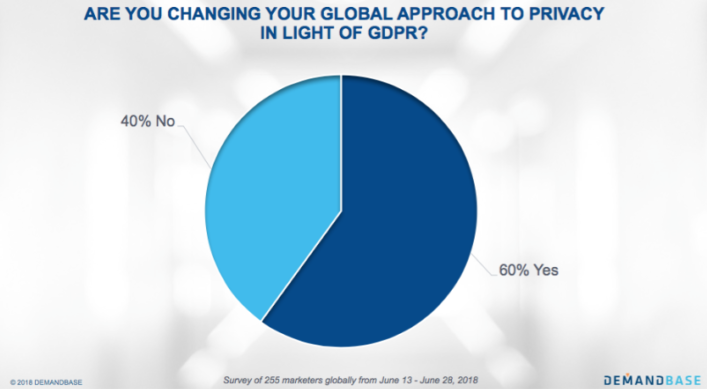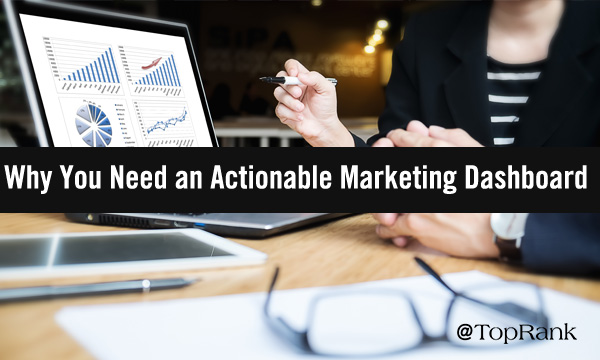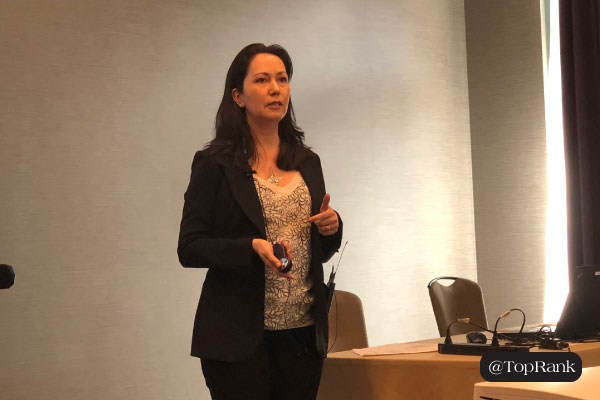The post Digital Marketing News: B2B Trends Study, Facebook’s Topics to Watch, & What Consumers Really Think of Personalized Ads appeared first on Online Marketing Blog - TopRank®.
Friday, March 8, 2019
Thursday, March 7, 2019
Wednesday, March 6, 2019
What B2B Marketers Need to Know About Data Privacy Today

 You enter a dim and shadowy room. Sitting before you is a wizened fortune teller, staring deeply into the mysterious glowing orb before her. As her hands hover over the crystal ball, she notices your skeptical frown. So, in order to validate her mystical powers, the stranger begins reciting facts about you: your name, where you’re from, where you went to college, which restaurant you ate at last week. “What is this sorcery?” you cry, your face growing pale. She pauses, smirks, and turns around her orb for you to see within. Turns out it’s merely a computer display, with your personal online data aggregated and readily available. The fortune teller reaches up and pulls off her mask to reveal… she’s an advertiser! And suddenly she’s pitching you on accounting software! via GIPHY You awaken from your nightmare with an unsettling feeling in the pit of your stomach, knowing it was all too real. One might expect their personal details to supernaturally emerge in the fortune teller’s booth, but not during their leisurely exploration of the web. Oh, wait a minute … For B2B marketers and customers alike, data privacy is a hot-button issue that won’t be going away anytime soon, with only 17% of consumers believing their personal information is “very secure” online. Here’s a rundown of what you need to know, both now and as you look ahead to your future.
You enter a dim and shadowy room. Sitting before you is a wizened fortune teller, staring deeply into the mysterious glowing orb before her. As her hands hover over the crystal ball, she notices your skeptical frown. So, in order to validate her mystical powers, the stranger begins reciting facts about you: your name, where you’re from, where you went to college, which restaurant you ate at last week. “What is this sorcery?” you cry, your face growing pale. She pauses, smirks, and turns around her orb for you to see within. Turns out it’s merely a computer display, with your personal online data aggregated and readily available. The fortune teller reaches up and pulls off her mask to reveal… she’s an advertiser! And suddenly she’s pitching you on accounting software! via GIPHY You awaken from your nightmare with an unsettling feeling in the pit of your stomach, knowing it was all too real. One might expect their personal details to supernaturally emerge in the fortune teller’s booth, but not during their leisurely exploration of the web. Oh, wait a minute … For B2B marketers and customers alike, data privacy is a hot-button issue that won’t be going away anytime soon, with only 17% of consumers believing their personal information is “very secure” online. Here’s a rundown of what you need to know, both now and as you look ahead to your future.
What is Data Privacy?
We all know that when we use the internet, our activities and information are often recorded and stored. But data privacy governs the way this info is collected, shared, and used. There has always been a contingent of the population with concerns around online data privacy (my mom refused to enter her credit card information on the internet for a good 10 years), but now these concerns are becoming more rampant and pervasive amidst prominent news headlines and frustrating first-hand experiences. Data privacy is now a part of our societal consciousness. Every business must account for it — especially as trust becomes an increasingly essential factor and regulations begin to clamp down.The State of Data Privacy in the Business World
We’re coming up on the one-year anniversary of the General Data Protection Regulation (GDPR) being implemented in the European Union. The sweeping new data privacy law showed its teeth in January when a $57 million fine was levied upon Google for disclosure violations. Essentially, GDPR comes down being clear about how you’re collecting and using data, and gaining explicit consent to do so — which is especially applicable to marketers as we strive to be more data and insight driven to create personalized experiences. Companies that operate in the EU have already been forced to reexamine their data privacy practices to ensure they’re aligned with the new guidelines. And across the world, proactive business leaders are showing support for the initiative, recognizing without the need for a crystal ball that this path represents the way of the future. (via Demandbase) Apple CEO Tim Cook has suggested that the U.S. should follow suit. “We at Apple are in full support of a comprehensive federal privacy law in the United States,” he said during a keynote speech in Brussels late last year, adding that our personal information is being “weaponized against us with military efficiency.”
(via Demandbase) Apple CEO Tim Cook has suggested that the U.S. should follow suit. “We at Apple are in full support of a comprehensive federal privacy law in the United States,” he said during a keynote speech in Brussels late last year, adding that our personal information is being “weaponized against us with military efficiency.”
This crisis is real. It is not imagined, or exaggerated, or crazy. - Tim Cook, CEO of AppleMeanwhile, Microsoft CEO Satya Nadella opines that the GDPR is “a fantastic start in treating privacy as a human right. I hope that in the United States we do something similar, and that the world converges on a common standard." We seem to be heading that way. There are already regulations in place governing commercial communications, such as CASL in Canada and CAN-SPAM in the U.S., but it seems inevitable these will eventually give way to broader data privacy laws. As a result, brands everywhere should take a hard look at their own customer data practices, not just because of these looming legal implications but even more so because it’s plain-old good business. In fact, a study by SAP found that 79% of consumers will ditch a brand if they learn their personal data is being used without their knowledge.
Considerations for B2B Marketers
In discussions of data privacy, there’s almost always a focus on the consumer impact, which can make it seem like more of a B2C issue on the surface. But of course, business buyers are people too, and when brand assets are at play, the scrutiny around data protection can be heightened. Here are some things to keep in mind as you contemplate data privacy and how it relates to your B2B marketing strategy.Transparency Holds the Key
The tricky thing is that while we can all understand the reservations people have about their data being leveraged for marketing purposes, we also know that customers (whether B2B or B2C) want personalization. And the only way we can really deliver on that is by leveraging data for marketing purposes. Therefore, it’s all about transparency. Whenever possible, be up-front and clear about when you’re collecting data, and why. Clarity is key: don’t bury them in small-print legalese. [bctt tweet="It’s all about transparency. Whenever possible, be up-front and clear about when you’re collecting data, and why. - @NickNelsonMN #B2BMarketing #DataPrivacy" username="toprank"]Be Cognizant of the Company You Keep
When polled by DemandBase last year, 80% of B2B marketers expressed some level of concern that their marketing technology vendors could expose them to risk for running afoul of GDPR guidelines. This speaks to another potential hazard: people will hold our brands accountable if they have a bad experience with us, even if we’re not the ones who ran afoul. It’s smart to be rigorous in vetting the data privacy practices of other businesses you partner with, especially if they influence customer touch points.Collect Only the Data You Really Need
Have you ever downloaded an app and had it ask permission to access information on your phone for no obvious reason? “Why is this calculator asking to get into my contacts?” That kinda thing immediately sets off alarms. Quality over quantity. Be judicious in the data you seek to acquire and make the most of it. [bctt tweet="Quality over quantity. Be judicious in the data you seek to acquire and make the most of it. - @NickNelsonMN #B2BMarketing #DataPrivacy" username="toprank"]Protect Your Customers, Protect Your Brand
Will.i.am is a musician, not a fortune-teller, but he still laid out a compelling vision for the future in a piece he wrote for The Economist recently. “Tomorrow’s entrepreneurs will create virtuous companies that honour people’s data,” he foretold. “They will make use of my data with my consent but I will always own it.” Why wait until tomorrow? B2B marketers would be wise to adopt this mindset now. I’ve argued before that data-driven marketing can play a major role in restoring the trust that has diminished amidst high-profile corporate breaches and fraud. Be virtuous in your approach. Honor as sacred the personal information of those you serve. Gather consent but understand that you don’t own the data; you’re only borrowing it to be helpful. This is a new world and we’re all figuring it out together. There are no magical solutions. But the first and most important step to a strong data privacy program is to be thoughtful and purposeful about how customer data factors at every level of your B2B marketing operation. Hungry for more insights on this topic? Check out my recent post to learn about the state of trust in marketing, how we got here, and where we’re heading.The post What B2B Marketers Need to Know About Data Privacy Today appeared first on Online Marketing Blog - TopRank®.
Tuesday, March 5, 2019
Want to Prove Content Marketing ROI? You Need an Actionable Marketing Dashboard

 Content marketers are believers. We believe our content brings real value to our prospects, clients, and partners. We believe our content is essential for driving demand. And we believe that content marketing is essential for bolstering our company’s bottom line. However, we’re also realistic; as it’s often said: Seeing is believing. So, we need to be able to show proof of content marketing ROI to get our key stakeholders to believe, too. And to do this, we need a source of truth that artfully and easily shows how we’re performing against our benchmarks, goals, and key performance indicators (KPIs), as well as where we’ve identified opportunities to improve results. We need an actionable content marketing dashboard. To put it simply, when set up right, an actionable dashboard allows us to answer two simple questions: 1) Is what we’re doing working? 2) Why is it (or isn’t) working? How does this help you identify, show, and prove ROI across the organization? Let’s dive in.
Content marketers are believers. We believe our content brings real value to our prospects, clients, and partners. We believe our content is essential for driving demand. And we believe that content marketing is essential for bolstering our company’s bottom line. However, we’re also realistic; as it’s often said: Seeing is believing. So, we need to be able to show proof of content marketing ROI to get our key stakeholders to believe, too. And to do this, we need a source of truth that artfully and easily shows how we’re performing against our benchmarks, goals, and key performance indicators (KPIs), as well as where we’ve identified opportunities to improve results. We need an actionable content marketing dashboard. To put it simply, when set up right, an actionable dashboard allows us to answer two simple questions: 1) Is what we’re doing working? 2) Why is it (or isn’t) working? How does this help you identify, show, and prove ROI across the organization? Let’s dive in.
How Actionable Content Marketing Dashboards Can Inform, Inspire, & Show ROI
What are the benefits of an actionable content marketing dashboard? All the fun and exciting benefits that come from knowing how your content is performing at a granular level aside, there are a ton of benefits that come from a holistic content marketing dashboard—especially when it comes to getting stakeholder engagement and buy-in. An actionable marketing dashboard isn’t just a long, dry analytics report. It’s visually engaging and easy to digest. [bctt tweet="An actionable #marketing dashboard isn’t just a long, dry analytics report. It’s visually engaging and easy to digest. - @Tiffani_Allen" username="toprank"]Highlight the Bottom Line for Leadership
The executives hold the purse-strings. And they want to ensure the budget you’ve been given is being put to good use. With an actionable dashboard, you can avoid the awkward “What have you done for me lately?” conversation with your leadership team by easily showing them how your content marketing efforts tie back to overall business objectives. With the right data and insight readily available in your dashboard, you can showcase performance from visit to sale, so when they ask: “Is this content getting us an ROI?” Your answer can be: “You bet. In fact, overall our content marketing efforts drove 200% ROI in 2018 and we’re trending to exceed that benchmark in 2019 based on our goals.” Of course, as a general rule, you don’t lose marketing funding for something that pays for itself and more.Inspire Your Peers Inside & Outside the Marketing Department
When your marketing team members are able to see the fruits of their labor, they’ll be more driven to continue what’s working and looking for innovation opportunities to take it to the next level. In addition, if you’ve been working with an internal subject matter expert such as your human resources director or sales manager to create content, showcasing how their contributions are making an impact will make them more open to ongoing collaboration—which can help all parties reach their goals. As a little tip, consider making a leaderboard in your dashboard so contributors can easily track how the content they’ve contributed to is performing. Adding a little competition based on objectives is a fun way to level-up performance. (Betting on this performance is optional.) [bctt tweet="When your #marketing team members are able to see the fruits of their labor, they’ll be more driven to continue what’s working and looking for innovation opportunities to take it to the next level. @Tiffani_Allen" username="toprank"]Set New Hires Up for Scalable Marketing Success
Another key benefit is that actionable marketing dashboards can help you scale your content marketing efforts. For example, if you find yourself proving so much ROI that you need to expand your team to keep up with demand, you can easily transfer knowledge to your new hires about what kind of content works and doesn’t work, and how they can know the difference. This kind of results-focused training and new hire orientation helps keep your full team aligned around what really matters—creating and marketing quality content that exceeds your benchmarks and blows your goals out of the water.Strengthen Relationships With Clients & Influential Collaborators
Whether you’re working with industry influencers to co-create content or you regularly engage clients to provide testimonials and case studies, you have the opportunity to use your marketing dashboard to show them not only how valuable they are to your marketing efforts, but the mutual value being incurred. For example, let’s say a client helped create a testimonial or case study that saw a 300% increase in visibility over benchmark for that content type. Your message to them can be that together you’ve driven an incredible amount of brand awareness for both of your organizations.Your Actionable Next Step? Create Your Content Marketing Dashboard
The performance of your content marketing means much more than traditional success metrics—it can mean visibility for your business, strength for your bottom line, and alignment for your internal teams. If you’re ready for more visibility and creating a stronger business case for your efforts, the first step is to create a dashboard of your own, tailored to your marketing and business objectives. Again, when properly set up, an actionable dashboard should allow you to answer two simple questions: 1) Is what we’re doing working? 2) Why is it (or isn’t) working? Wondering how to create this magical dashboard? Check out our guide to marketing dashboard essentials to get started on your path toward data-driven success.The post Want to Prove Content Marketing ROI? You Need an Actionable Marketing Dashboard appeared first on Online Marketing Blog - TopRank®.
Monday, March 4, 2019
Friday, March 1, 2019
The Real Value of Martech & Automation? The Humanization Potential, According to Liz Cope

 Standing before a room of eager-to-learn marketers at B2B Marketing Exchange, Liz Cope, Director of Marketing Technology and Operations at Ingersoll Rand, was an open, honest, vulnerable … human. “This is so embarrassing,” she said, admitting that some fundamental marketing functions were missing the mark at her multi-billion-dollar company. Liz’s candor helped audience members feel right at home and not alone. After all, we’ve all been disappointed to learn that one of our core marketing functions or strategies needed to be reworked, rebooted, or reimagined entirely. Her candid approach also tied well into her session’s theme: Martech, Process and People: Humanizing the Journey to Channel Transformation. Liz’s presentation was robust, detailing key technologies, processes, and the organizational structure she and her team have put in place to transform their channel marketing strategy. But her message was simple: Automate to humanize. And in a time where marketers are being challenged to deliver more personalized, customer-centric experiences to create connections and drive results, this premise deserves consideration.
Standing before a room of eager-to-learn marketers at B2B Marketing Exchange, Liz Cope, Director of Marketing Technology and Operations at Ingersoll Rand, was an open, honest, vulnerable … human. “This is so embarrassing,” she said, admitting that some fundamental marketing functions were missing the mark at her multi-billion-dollar company. Liz’s candor helped audience members feel right at home and not alone. After all, we’ve all been disappointed to learn that one of our core marketing functions or strategies needed to be reworked, rebooted, or reimagined entirely. Her candid approach also tied well into her session’s theme: Martech, Process and People: Humanizing the Journey to Channel Transformation. Liz’s presentation was robust, detailing key technologies, processes, and the organizational structure she and her team have put in place to transform their channel marketing strategy. But her message was simple: Automate to humanize. And in a time where marketers are being challenged to deliver more personalized, customer-centric experiences to create connections and drive results, this premise deserves consideration.
The Real Value of Martech & Automation is Human
Marketing technologies exist to automate time-consuming processes; to eliminate and alleviate the level of human touch necessary to complete a task or series of tasks, while also delivering more intelligent insights. So, how can automation be a gateway to humanization? The answer is quite simple, for Liz and her team. “We can use martech to automate work for our internal employees and channel partners to free them up to engage in valuable human interactions with customers,” she stated. “We can automate to humanize our brands.” And they’ve put this mantra in action.The Humanizing Journey
Ingersoll Rand, a manufacturing company that’s been in business for more than 130 years, gets most of its sales and revenue through indirect distribution channels—meaning the company has to manage a global network of distribution partners. To arm those channel partners with the tools they need to be effective and successful, Liz and her counterparts have been working hard to ensure the right marketing technologies, processes, and people are in place. Another major driver of their hard work is the desire to build a customer-focused business. According to Liz, a new batch of research shows that companies that are perceived as easier to do business with will have three-times more share-of-wallet in the future. And Ingersoll Rand wants to capture that share. “When we’re genuinely invested in our customers—invested in putting them first—we can gain their trust. And we can earn their confidence and mindshare to increase our market share and share-of-wallet,” Liz declared. So, where are Liz and her team at on their “automate to humanize” journey and what results have they seen? While Liz admits they’re just getting started, they’ve begun by focusing on two improvement opportunities:- Improving lead management. On average, it was taking at least three days for leads to get routed to the right partner.
- Enhancing accessibility to marketing collateral. According to Liz, there were several different systems being used to provide resource materials, each requiring a separate login and password.
- When it comes to technology, they’ve implemented a partner relationship management (PRM) system to automatically route leads to partners and house an asset library. As for initial results, the ability to automatically route leads has reduced internal effort by an impressive 30%. In addition, they now have more visibility into how partners are consuming content, so they can personalize communications and support on the go-forward. Finally, they’re in the midst of a martech stack evaluation to understand where there is overlap, gaps, and the most value to be gained.
- When it comes to process, they’ve identified key priorities to keep them focused and enhance their ability to scale efforts across the organization. For example, they’re building out a “marketing standard work” framework to ensure employees know what steps to take when executing work.
- When it comes to people, they’ve constructed an organizational structure that allows collaboration and visibility at multiple levels. For example, they’ve established a Marketing Leadership Council to act as a steering committee.
The B2B Marketer’s Takeaway
If your organization wants to become truly customer-focused and deliver more personalized experiences, you need to enable your internal team, partners, and customers to be successful. While Liz’s insights came from work to transform a channel strategy, any B2B marketer has the opportunity to ensure the right people, processes, and marketing technologies are in place to deliver content and experiences that empower their audiences, humanize their brands, and create efficiencies at scale. For more insights from the conference, you can follow @toprank, @leeodden, @azeckman, and @CaitlinMBurgess on Twitter. Stay tuned for more by following the blog here.The post The Real Value of Martech & Automation? The Humanization Potential, According to Liz Cope appeared first on Online Marketing Blog - TopRank®.
Subscribe to:
Posts (Atom)